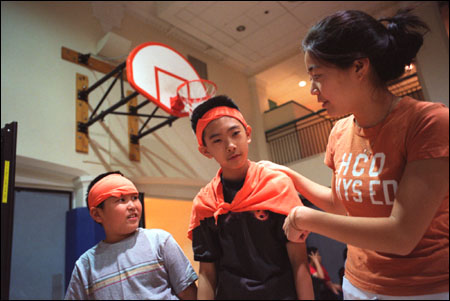Summer in the city: Local teens work at PBHA-run camps
Camps are ‘a unique summer job’

Each summer, more than 850 economically disadvantaged children from Boston and Cambridge have a fun, safe, enriching experience at the 12 summer camps run by the Phillips Brooks House Association (PBHA).
But these kids aren’t the only ones who benefit from PBHA’s Summer Urban Program camps. More than 80 teenagers, many of them former campers, earn a paycheck – as well as self-esteem and some valuable skills – as junior counselors for the camps.
Photo gallery:
Phillips Brooks House Association
summer camp gallery
“I realize how much of a role model I can be. Knowing that you really can affect the kids’ lives like that, it’s really powerful,” says Jessica Cetoute, a high school junior from Roslindale and second-year junior counselor – “JC” – at PBHA’s Roxbury Youth Initiative Camp.
“We’ve always viewed the JCs as leaders in the community and co-teachers in the classroom,” says PBHA Executive Director Gene Corbin. “It’s a unique summer job.”
This opportunity for youth in the community to work alongside college-age senior counselors and directors is possible through PBHA’s partnership with the Boston Youth Fund, Action for Boston Community Development (ABCD), and the Mayor’s Youth Fund in Cambridge, with additional funding from Harvard via the Office of Government, Community and Public Affairs. The junior counselors assist with each camp’s many activities – from daily academics to field trips – providing one-on-one help to a camper who needs it, counting heads at the swimming pool, or making up a dance routine for the end-of-the-year talent show.
“The campers keep me coming back,” says Helen Tran, who’s graduated to junior counselor coordinator after four years as a JC at the Chinatown Adventure (CHAD) camp. “You have a lot of fun, a lot of memories.”
Memories like Tran’s – she was a CHAD camper for five years before becoming a JC – are a key component of the junior counselor program. With college students as the camps’ directors and senior counselors, turnover is necessarily high. “The JCs are the institutional memories of the camps,” says Steve Lee ’06, another junior counselor coordinator.
In addition, the junior counselors provide a valuable link to the communities served by the camps. “They give us fair warning when things are happening in the community that we need to know about,” says Lee, noting that when some youth violence resulted in a teen death in South Boston last summer, the junior counselors alerted the senior staff about which kids might have been affected by the event.
“You know who might be having a hard time at home,” says South Boston Outreach JC Paula Barrows, a senior at Boston Latin Academy who lives in South Boston. She adds that her native knowledge has helped camp staff navigate Boston’s labyrinthine streets en route to field trips. “It’s nice to know that although I might be younger than all the senior counselors and directors, they still respect me because I have ‘wisdom,’” she says.
Junior counselors command a unique respect among their campers, too. Lee recalls filling in for an absent senior counselor in a classroom at the Native American Youth Enrichment Program (NAYEP) camp. Junior counselor Wais Abhar gained immediate control of the unruly group. “He turned a potentially crazy day into a really good day,” says Lee.
Along the way, the junior counselors pick up some valuable skills.
“I’ve learned patience,” says Barrows. “Each child is different, and you have to be patient with them in different ways.”
For Samuel De Pina, a second-year JC at Boston Refugee Youth Enrichment (BRYE), working with a largely Vietnamese population has expanded his world. “I’ve learned that other races are cool,” says De Pina, who is of Cape Verdean descent. “And I’ve learned how to count in French, Spanish, and Vietnamese.”
In addition to job-related training, PBHA provides its junior counselors with mentoring and skills aimed at getting them ready for college. By the end of the summer, each JC will complete a 500-word college application essay with the help of their senior counselors.
Yet the junior counselors are pretty much unanimous in their assessment of the job’s biggest benefit: It’s the kids.
“I keep coming back to Southie because I love it,” says Barrows. “This program for me has been so much more than a paycheck.”




